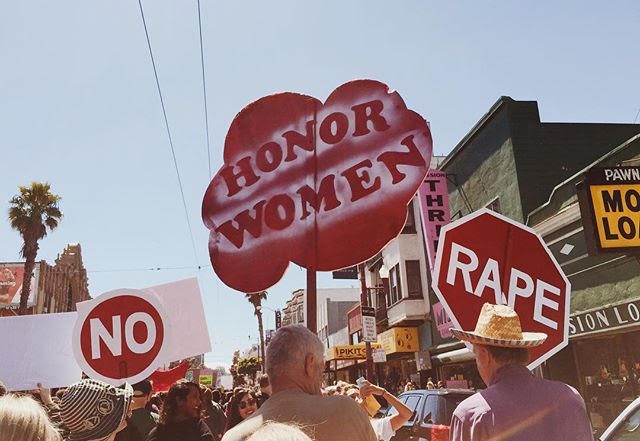
The profound failure of San Francisco to address sexual assault in a way that prioritizes survivors has become a major issue in the race for district attorney.

The three leading candidates all released plans in the past two weeks to take on a crisis that Bianca Rosen reported on for us in 2017:
In 2016, the vast majority of adult sexual assaults in San Francisco went uninvestigated or prosecuted. According to a list I generated through SF Open Data, there were 757 reports of adult sexual assault that year. When I asked the Police Department directly, the number they gave me was 694.
But even using SFPD’s number, out of the 694 reports of adult sexual assault, 297 — or 43 percent — were investigated, 91 — or 13 percent — were referred to the D.A.’s office, 11 adult and child sexual assault cases, or 1.6 percent, went to trial, and nine, or 1.3 percent, resulted in a guilty verdict. These numbers are staggering but sadly typical in terms of historical patterns and trends that persist across the country.
In 2016, the vast majority of adult sexual assaults in San Francisco went uninvestigated or prosecuted. According to a list I generated through SF Open Data, there were 757 reports of adult sexual assault that year. When I asked the Police Department directly, the number they gave me was 694.
But even using SFPD’s number, out of the 694 reports of adult sexual assault, 297 — or 43 percent — were investigated, 91 — or 13 percent — were referred to the D.A.’s office, 11 adult and child sexual assault cases, or 1.6 percent, went to trial, and nine, or 1.3 percent, resulted in a guilty verdict. These numbers are staggering but sadly typical in terms of historical patterns and trends that persist across the country.
The response from the candidates shows that Rosen’s research, which was the topic of her master’s thesis in the USF Urban and Public Affairs Program, has forced the issue into the forefront of political debate.
Lief Dautch proposed last week that the city provide a tracking system for rape kits – an online way for survivors to monitor what’s happened to the evidence that may be critical to their case. “One of the number one issues that survivors complain about is not knowing what’s happening,” he told me.
A simple tracking system would allow survivors real-time access to their case files – and would make it easy for them to follow the case without having to reach out to the cops or prosecutors. “Picking up the phone and making that call can be triggering,” he said.
The detailed access to the case files “helps hold prosecutors and police accountable,” he told me.
This is not a new idea – the state of Idaho has already implemented it, as has the city of Houston. In fact, he said, “eighteen states are ahead of us. San Francisco can do better.”
His is the most specific of any of the recent proposals.
Chesa Boudin also released a six-point plan to make the city’s response to sexual violence more survivor-centric:
“We need to guarantee that every woman and man who is sexually assaulted in this city is treated compassionately, professionally and effectively,” said Boudin. “As District Attorney, I will ensure that prosecutors have the best training, that each case is thoroughly investigated and reviewed, and that every survivor is treated with respect and compassion.”
“Sexual assault is a terrible epidemic and we need to do better as a city in responding to survivors,” said Sup. Hillary Ronen. “Sex crimes are far more likely to be committed against trans/gender-non-conforming/non-binary, women, poor, homeless, people of color. I strongly support Chesa’s approach and believe it will make a huge impact in how these cases are handled.”
Boudin told me he supports Dautch’s proposal to track rape kits, and said that he would have his staff go beyond that to reach out to survivors on a regular basis to update them on the status of their cases
And he said the DA’s office has to be willing to file cases, even when that’s challenging (as sexual assault cases often are). “We have to be bold enough to try cases that we might not win,” he said. “Even if the case is hard to prove, we need to be willing to try. That would show vulnerable communities that we have their backs.”
I called Suzy Loftus to talk about her plans, and she referred me to her website, which includes a new statement of her priorities:
In my first 100 days, I will convene a team to re-examine every eligible rape case that was discharged for lack of evidence. I will assign special investigators to identify if there is additional evidence, and skilled prosecutors to build effective cases for prosecution in light of new discoveries. I will recruit and train the best prosecutors to handle these cases. We must train all law enforcement officials to effectively build cases through multi-disciplinary forensics teams that reduce the burden of justice on victims and collect as much evidence, forensic and circumstantial, as possible.
In a debate at the Bernal Heights Democratic Club, Boudin made another point: He said that city could spend more time prosecuting serious violent crimes if the district attorney wasn’t pushing so many less-serious crimes to trial.
“Two thirds of all jury trials in San Francisco are misdemeanor cases,” he said. “That’s the highest of any county in California. We need to flip that.”


